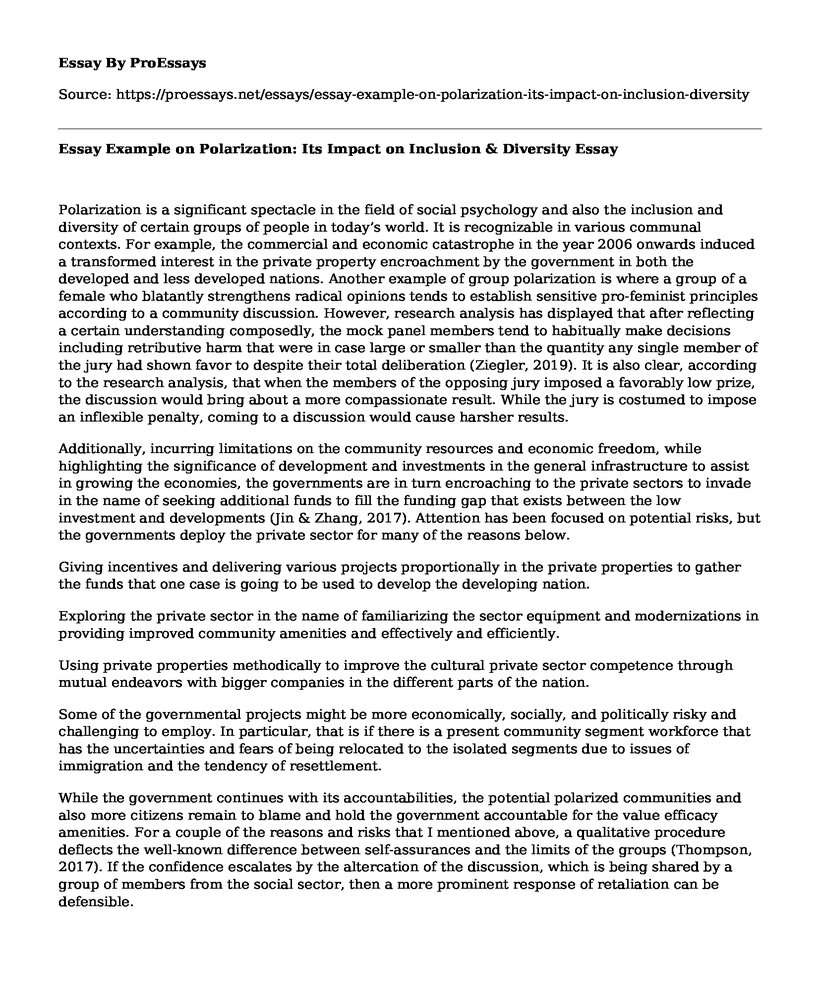Polarization is a significant spectacle in the field of social psychology and also the inclusion and diversity of certain groups of people in today’s world. It is recognizable in various communal contexts. For example, the commercial and economic catastrophe in the year 2006 onwards induced a transformed interest in the private property encroachment by the government in both the developed and less developed nations. Another example of group polarization is where a group of a female who blatantly strengthens radical opinions tends to establish sensitive pro-feminist principles according to a community discussion. However, research analysis has displayed that after reflecting a certain understanding composedly, the mock panel members tend to habitually make decisions including retributive harm that were in case large or smaller than the quantity any single member of the jury had shown favor to despite their total deliberation (Ziegler, 2019). It is also clear, according to the research analysis, that when the members of the opposing jury imposed a favorably low prize, the discussion would bring about a more compassionate result. While the jury is costumed to impose an inflexible penalty, coming to a discussion would cause harsher results.
Additionally, incurring limitations on the community resources and economic freedom, while highlighting the significance of development and investments in the general infrastructure to assist in growing the economies, the governments are in turn encroaching to the private sectors to invade in the name of seeking additional funds to fill the funding gap that exists between the low investment and developments (Jin & Zhang, 2017). Attention has been focused on potential risks, but the governments deploy the private sector for many of the reasons below.
Giving incentives and delivering various projects proportionally in the private properties to gather the funds that one case is going to be used to develop the developing nation.
Exploring the private sector in the name of familiarizing the sector equipment and modernizations in providing improved community amenities and effectively and efficiently.
Using private properties methodically to improve the cultural private sector competence through mutual endeavors with bigger companies in the different parts of the nation.
Some of the governmental projects might be more economically, socially, and politically risky and challenging to employ. In particular, that is if there is a present community segment workforce that has the uncertainties and fears of being relocated to the isolated segments due to issues of immigration and the tendency of resettlement.
While the government continues with its accountabilities, the potential polarized communities and also more citizens remain to blame and hold the government accountable for the value efficacy amenities. For a couple of the reasons and risks that I mentioned above, a qualitative procedure deflects the well-known difference between self-assurances and the limits of the groups (Thompson, 2017). If the confidence escalates by the altercation of the discussion, which is being shared by a group of members from the social sector, then a more prominent response of retaliation can be defensible.
Conclusion
In conclusion, as a policymaker, I would employ a qualitative media process to be reporting on the issues that risk polarization for effective results to the whole nation. I would also want to study the introductions of new limitations and the magnitude of the change that imposes in solving the matter of governmental, private sector encroachment and also confirmations of the inclination initiated towards the improvement of infrastructure and the particular need s of the citizens, thus a greater environmental, social and political responsibility and improvement to all members.
References
Jin, T., Zhang. (2017, August). Improved practical polarization mode dispersion (PMD) measurement based on fixed analyzer. In 2017 16th International Conference on Optical Communications and Networks (ICOCN) (pp. 1-3). IEEE. https://ieeexplore.ieee.org/abstract/document/8121267/
Thompson, K. L. (2017). Legislative Productivity and Party Control: a Story of Polarization? https://digitalcommons.bucknell.edu/honors_theses/404/
Ziegler, R. (2019). Group Polarization Revisited: A Processing Effort Account. Personality and Social Psychology Bulletin, 45(10), 1482-1498. https://journals.sagepub.com/doi/abs/10.1177/0146167219833389
Cite this page
Essay Example on Polarization: Its Impact on Inclusion & Diversity. (2023, Sep 04). Retrieved from https://proessays.net/essays/essay-example-on-polarization-its-impact-on-inclusion-diversity
If you are the original author of this essay and no longer wish to have it published on the ProEssays website, please click below to request its removal:
- The Unintended Consequences of Standardized Testing: Essay Sample
- Research Paper on Association Between Vaccines and Autism
- Effectiveness of Public Awareness Education in Reducing Stigma in the UK Paper Example
- Paper Example on Preschoolers Learn Best Through Doing: Teach Science for Optimal Development
- Essay Example on Nurse Burnout: A Global Professional Challenge Affecting Patient Safety
- A Vindication of the Rights of Woman - Essay Sample
- El Callejon del Beso: A Romantic Folk Tale of Mexico - Book Review Sample







